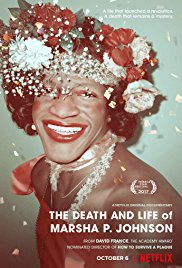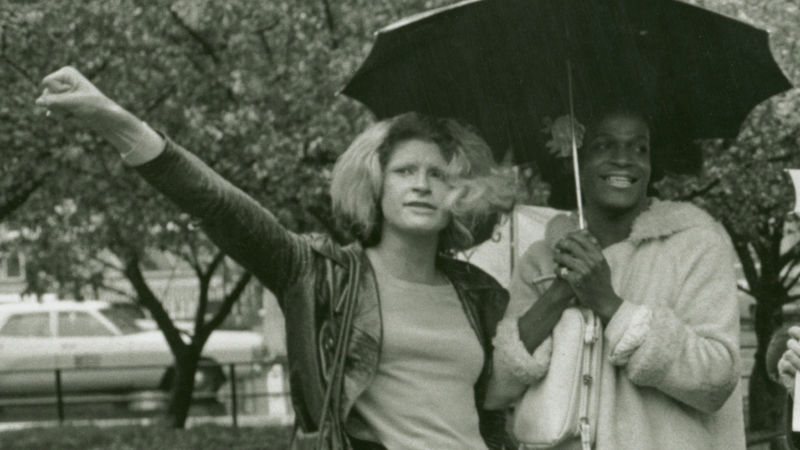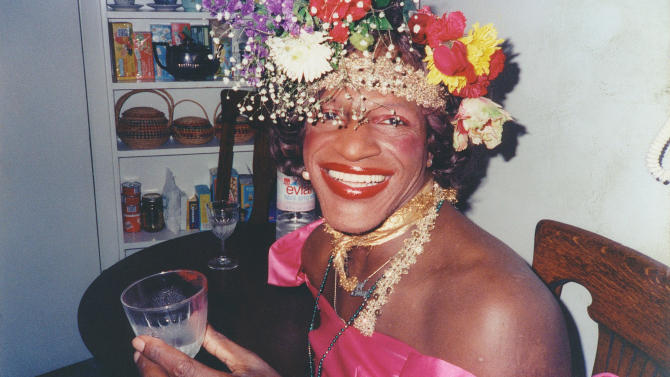by Glenn Dunks
 It is sadly just a matter of fact that women of colour rarely get documentaries made about them without tragedy informing their very existence. “Death” is even right there at the start of the title for David France’s new film about one such pioneering person. And indeed, the mystery surrounding Marsha P. Johnson’s death is what acts as the central spine of his The Death and Life of Marsha P. Johnson as one activist, Victoria Cruz, sets about solving the mystery of the death of another activist 25 years ago.
It is sadly just a matter of fact that women of colour rarely get documentaries made about them without tragedy informing their very existence. “Death” is even right there at the start of the title for David France’s new film about one such pioneering person. And indeed, the mystery surrounding Marsha P. Johnson’s death is what acts as the central spine of his The Death and Life of Marsha P. Johnson as one activist, Victoria Cruz, sets about solving the mystery of the death of another activist 25 years ago.
But like the literal meaning behind the title of France’s last film, the Oscar-nominated masterwork How to Survive a Plague, this new film is also about “life” and surviving and ultimately acts as a testament to Johnson’s tenacity and pure force-of-nature attitude in the face of adversity – a tired cliché of a phrase that is nonetheless truly warranted here...
Picking up where Michael Kasino’s 2012 documentary Pay it No Mind: Marsha P. Johnson left off (it is only 55 minutes and Kasino has uploaded it to YouTube), The Death and Life of Marsha P. Johnson puts not just a face and a voice (and whatta voice it is!) to the name that has become synonymous with queer rights activism. It also puts a larger than life personality to it, too, overflowing as she was with energy whenever anybody was around. Watching this film and I reckon one can truly appreciate what made her a de facto leader at a time when many were happy to remain hidden.

There is much cross-over archival footage between the two documentaries, most of which is about as rough as guts as you can get without actually being pulled out from a barrel of gravel. In that regard, Netflix is probably a great home for the film as many of its images – as captivating and indelible as they are – become overly messy on a larger screen. On the matter of video, it is interesting to note that while the film doesn’t overtly go into the wider reporting of her death, it is perhaps emblematic of the times in which she died that there is no mainstream news reportage about Marsha featured in the film.
The film also shines a light on the fact of life that is an aging population of trangender men and women, many of whom can counted Marsha as not just a friend, but a saviour. Like The Pearl, which did the festival rounds last year (I wasn’t much of fan for reasons beyond its fascinating subject matter), it swerves a hard left from the likes of Maura Pfefferman, and these stories are imbued with a deep sense of tragic and ultimately failure towards a generation of brave people, many of whom down and out before they ever got the chance to succeed.
They also highlight Johnson’s own story, fleshing it out and colouring in some of the lines of her story. It’s hard to not watch the film and wonder about what Marsha would have made of the next 20 years of not just the LGBTQI rights movements, but specifically as they related to transgender activism and visibility. What would she make of the spate of murders of black trans women, and the vigils and news attention they now garner (if not necessarily action). As Victoria Cruz stands on the now renovated Christopher Street Wharf where Johnson likely died (and the film heavily supports the theory that she was murdered rather than suicide, which is what her death was quickly ruled as by uncaring police), what would she have made of New York City’s gentrification and the almost normalisation of queer identity or the sudden re-radicalisation of it in the face of sweeping conservative apathy?

It’s not just her memory that lingers over The Death and Life, its her legacy both fulfilled and unfulfilled. What makes this film so powerful, is that it does indeed offer what the title promises. The death and the life of Marsha P. Johnson. If the doc sometimes veers away from being about the woman whose name is in the title, then it’s important to remember that for Johnson, her life was her friends, too. It might sound corny, but to her, a friend was anybody who needed one. And so while the film is an important and worthy viewing experience, it also proves that her even if death, in some ways she manages to still Johnson lives.
Release: Streaming everywhere on Netflix
Oscar Chances: France's name may get attention, but the doc branch isn't as kind to queer docs as they were in the past when they handed statues to The Life and Times of Harvey Milk and Common Threads.
[Editor's Note: This documentary has recently come under fire as trans filmmaker Reina Gossett claims that the film is based on her work. France has since released a statement about her claims.]